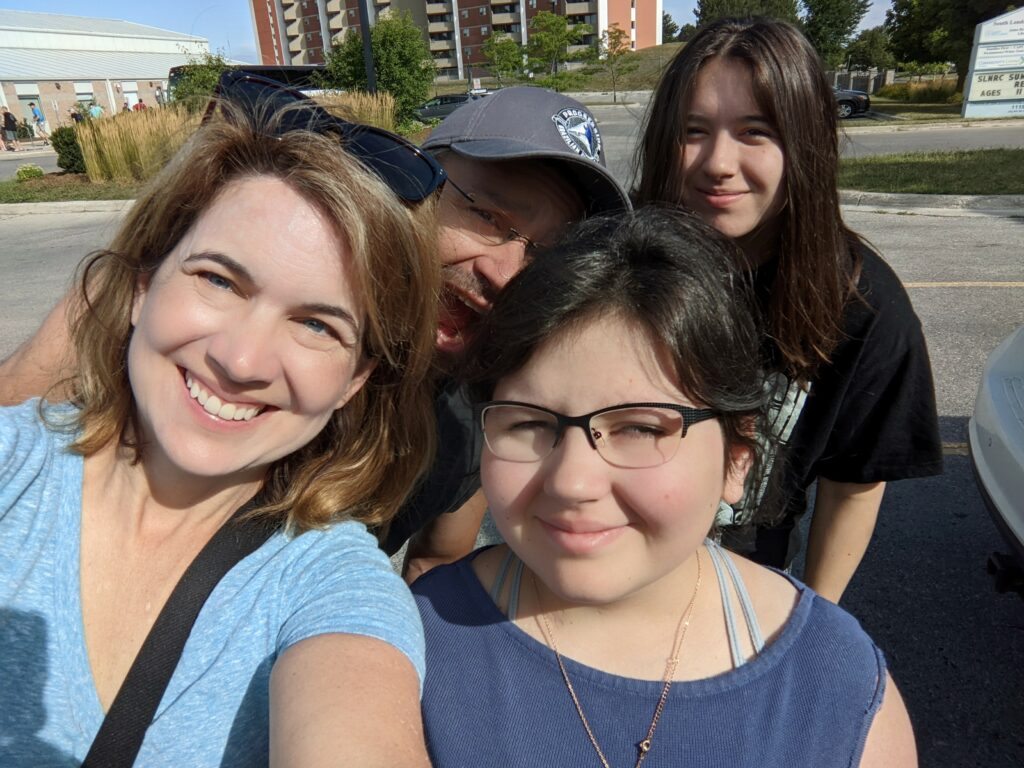
Adrienne Co-Dyre (she/her) is the proud mom of 12-year-old Gabby, a three-time leukemia survivor.
During her pediatric journey, Gabby received standard protocol treatment, immunotherapy, cranial/ocular and total body irradiation, and a stem cell transplant. Throughout this time, Adrienne focused her energy on learning everything she could about the disease and treatment protocols.
Today, Adrienne is a fierce advocate for pediatric cancer patients and their families, and she uses her accumulated knowledge and experience to inspire changes in policy, research, and communication around pediatric cancer treatments. Adrienne has been instrumental in establishing several advocacy groups, including Helena’s Hope and, recently, the Canadian Pediatric Cancer Consortium. She has also collaborated with cancer researchers in the BioCanRx Cancer Stakeholder Alliance Learning Institute and the Pediatric Cancer Research Priority Setting Partnership.
Rising Stars had the privilege of asking Adrienne about her journey as a patient/caregiver advocate and how trainees in cancer research can begin to approach meaningful collaborations with patient partners in their education and research experiences.
Could you tell us about your experience as a patient/caregiver advocate? Why did you choose to get involved in cancer research?
My experiences as a patient/caregiver advocate have been broad and mostly come about through happenstance. During Gabby’s battles with leukemia, I was entirely focused on her care and learning everything I could to understand her treatment protocols and the health environment. It was after her last cancer battle, that included a stem cell transplant, that I met another ‘momcologist’ while visiting Camp Trillium (now Campfire) while sipping coffee on the front porch of our cabin. Along with her daughter, this other cancer mom was already out in the world raising funds to support pediatric cancer research. Together, we commiserated on the challenges we faced during our children’s cancer treatment and talked about the changes we wanted to see in the pediatric cancer journey. This led us to start a new advocacy group, Helena’s Hope, whose mission is to create a National Childhood Cancer Strategy, systems changes and research funding. From there, I was able to attend the BioCanRx Stakeholder Alliance Learning Institute as a Patient Scholar, participate in the Pediatric Cancer Research Priority Setting Partnership, and am now helping to build the Canadian Pediatric Cancer Consortium. All of this comes from a deep desire to use my experience and knowledge in a way that helps pediatric cancer patients survive and lead long, healthy lives.
What would be your ideal role as a patient partner? If you could be involved in any capacity, what would that look like?
My ideal role as a patient partner is one in which I am respected for my experiences and understanding of my family’s journey. The medical and research worlds are deep, broad, and complex with most professionals having advanced science degrees. However, unless researchers, scientists, clinicians, etc., ALSO have experience as a patient/caregiver, then there is much of the journey that they have not encountered and do not connect to their own day-to-day professional lives. Managing a serious/critical illness, its treatment, and recovery brings together professionals and specialists from across the medical spectrum – but seldom does this large collective interact fully with itself. Only the patient at the center sees and experiences the ongoing complexity of their care and all the outcomes. There is much value that this user experience can provide.
My ideal role as an advocate is one that I hold now, as a leader who facilitates conversations from stakeholders across the pediatric cancer landscape – to share knowledge, devise solutions to gaps and challenges, and source resources for further research.
While conversations around research logistics, planning, and funding may primarily happen at the level of the principal investigator, much of the hands-on/bench science is carried out by trainees in cancer research. In your opinion, is there a role for trainees in collaborations with patient partners? What could that look like?
I absolutely see a role for trainees with patient partners! Patient partners can provide key information about how potential research plans will be received, if they are feasible from a patient perspective, and what research priorities may be for patients. We can advocate for funding, for both select research projects and for national organizations (like the Canadian Cancer Society). We can help trainees think ‘outside of the box’ of current research themes and offer knowledge that we’ve learned in our journeys. Maybe most importantly, we can ask questions through the eyes of someone who has experienced ‘research’ in action!
If you could tell trainees in cancer research anything, what would you want to say? Is there advice you would give as they look to shape their careers in research?
Advice that I would offer trainees in cancer research is to give room for patients/advocates as partners and keep an open mind about what they may provide to your work. I would also advise that trainees learn about the experiences of their patient partners and be prepared, emotionally and intellectually, to engage with them. Patient journeys can be emotionally difficult to hear and harder still to respond to. Remember that these stories are difficult for the patient/advocate to tell and that patients are doing so to support research: likely with the hope that their stories will help others. Please be patient as patients/advocates learn about your research – often with no science background.
Lastly, and maybe most importantly, remember how grateful patients/advocates are for your work. You may not meet the cancer patients who survive because of your efforts but they are surely grateful to you. Your work matters and helping you succeed is why we do what we do.
Tags:
Posted on:
